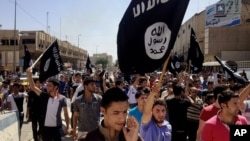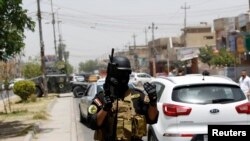As the United States prepares to engage with long-time foe Iran as part of a strategy to blunt the advance of the Sunni militant group known as the Islamic State of Iraq and the Levant (ISIL), a terrorist expert says the key to ISIL’s goal of creating an Islamic caliphate encompassing Syrian and Iraqi territory is maintaining the Sunni population's support.
Greg Barton, who co-directs the Center for Islam and the Modern World at Australia’s Monash University, says US-Iranian consultation would be significant, suggesting Iran prefers to see a stable Iraq under friendly Shi’ite Prime Minister Nouri al-Maliki to an unstable and hostile Sunni jihadist movement in Iraq that poses a threat to its own security.
"Perhaps they [Iran] can work with the Americans and others in getting the Maliki government to realize that the solution to what is happening is as much a political solution as a military solution," Barton said.
"The reason ISIL has taken so much territory is because local populations are so jaundiced towards Baghdad and, if Baghdad can work to build confidence with the Kurds in the northeast and with the Sunnis in the Sunni Triangle to the northwest of Baghdad, they have half a chance of using these tendencies of ISIL to outstay its welcome through its draconian moral policing and use it to their advantage and regain towns and cities, perhaps getting Mosul back," he added.
Barton says ISIL’s goal is not marching on Baghdad, but establishing an Islamic caliphate encompassing eastern Syria and north-central Iraq. He says they have nearly achieved that, but whether they can keep the territory captured remains an open question. The brutal occupation, he says, could turn the Sunni population against them.
Al-Jazeera reports the source of ISIL’s funding and power remains unclear. According to Barton, state funding is complicated to prove but private giving is not.
"There are a lot of private donations coming out of Saudi Arabia, Qatar and Kuwait and the other Gulf states," Barton noted. "In more recent times, it [ISIL] has its own source of funding controlling gas and oil fields in the east of Syria that gives it a revenue stream and now, having overrun Mosul, it acquired a lot of cash and gold bullion and military hardware.
"So, it’s probably sitting pretty as far as financial resources and military hardware goes. The key thing is whether it can hold the social capital it currently enjoys with the support of Sunnis in the north of Iraq and the east of Syria," he added.
U.S. State Department spokeswoman Jennifer Psaki acknowledged Monday that money and assistance are flowing to ISIL from Syria and that it is a matter the United States is raising with Iraq’s Sunni neighbors.
Greg Barton, who co-directs the Center for Islam and the Modern World at Australia’s Monash University, says US-Iranian consultation would be significant, suggesting Iran prefers to see a stable Iraq under friendly Shi’ite Prime Minister Nouri al-Maliki to an unstable and hostile Sunni jihadist movement in Iraq that poses a threat to its own security.
"Perhaps they [Iran] can work with the Americans and others in getting the Maliki government to realize that the solution to what is happening is as much a political solution as a military solution," Barton said.
Islamic State of Iraq and the Levant
Islamic State of Iraq and the Levant- Formed by members of al-Qaida-linked groups in Syria and Iraq
- Aims to establish an Islamic emirate across Syria and Iraq
- Led by Abu Bakr al-Baghdadi, former leader of al-Qaida in Iraq
- Believed to have 5,000 to 7,000 fighters
- Has launched high-profile attacks in both countries
Barton says ISIL’s goal is not marching on Baghdad, but establishing an Islamic caliphate encompassing eastern Syria and north-central Iraq. He says they have nearly achieved that, but whether they can keep the territory captured remains an open question. The brutal occupation, he says, could turn the Sunni population against them.
Al-Jazeera reports the source of ISIL’s funding and power remains unclear. According to Barton, state funding is complicated to prove but private giving is not.
"There are a lot of private donations coming out of Saudi Arabia, Qatar and Kuwait and the other Gulf states," Barton noted. "In more recent times, it [ISIL] has its own source of funding controlling gas and oil fields in the east of Syria that gives it a revenue stream and now, having overrun Mosul, it acquired a lot of cash and gold bullion and military hardware.
"So, it’s probably sitting pretty as far as financial resources and military hardware goes. The key thing is whether it can hold the social capital it currently enjoys with the support of Sunnis in the north of Iraq and the east of Syria," he added.
U.S. State Department spokeswoman Jennifer Psaki acknowledged Monday that money and assistance are flowing to ISIL from Syria and that it is a matter the United States is raising with Iraq’s Sunni neighbors.





